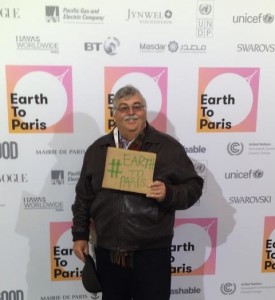A month ago, the United Nations held its Climate Change Conference in Paris where representatives from 196 nations gathered for a historic agreement, and a Benicia businessman was there to witness it.
Grant Cooke, the CEO of Benicia mechanical engineering firm Sustainable Energy Associates, has authored books on the topic of climate change, including “The Green Industrial Revolution” and “Global Energy Innovation,” which he wrote with Woodrow Clark. Clark worked with the United Nations Intergovernmental Panel on Climate Change, which was awarded the Nobel Peace Prize in 2007 and has also served with Beverly Hills’ United Nations Association.
“This group was trying to put together representatives to attend the Paris conference, and I became one of their representatives,” Cooke said.
The conference was held in multiple venues in the Paris suburb Le Bourget from Nov. 30 to Dec. 11. The event fell just two weeks after a series of terrorist attacks in Paris that left 130 people dead.
“There was a lot of security and a lot of separation in the various activities,” Cooke said.
Nonetheless, approximately 40,000 people from across the world attended the conference, which had the goal of getting the nations to agree to limit global warming to 2 degrees Celsius by 2100.
“The interesting thing about the conference is that most of the work that was done in the agreements were done behind closed doors with a variety of high-level government officials,” Cooke said. “The negotiations of the agreement were announced at the end.”
During the conference, Cooke attended events like the Earth to Paris summit, which saw presentations from figures like Paris Mayor Anne Hidalgo, actor Alec Baldwin and California Gov. Jerry Brown.
“(Brown) made a presentation on what California was doing,” Cooke said. “He talked about the necessity for developing political will and that the reason California is moving forward at such a rapid manner had to do with the fact that the California voters were completely in support of non-carbon energy generation.”
Cooke was also impressed with the large number of college students he saw as well as the people he met with in the field of emerging technologies.
“A guy from Berkeley that was there had developed a biogas processing system that I had never seen before,” he said. “There was also a fellow from New York that I had a chance to talk with who’s developing an ECHO community in the Virgin Islands.”
“It was nice to see that there was a large contingent of young people that were actively pursuing a more environmentally friendly planet.”
For Cooke, one of the highlights of the conference was seeing the United States and China, two countries known for high pollution rates, come together to draft an agreement on greenhouse gas reduction.
“The Chinese dream was built on cheap coal generation, as the American dream was built on cheap carbon generation,” he said. “Now, both nations have realized the damage that’s being done to the planet and are slowly changing their perspective to help reduce the amount of climate levels going into the atmosphere.”
Cooke believes that political structure and financial investment can drive an economy not based on oil and that Benicia should adopt that model.
“Benicia is primarily a carbon-based economy,” he said. “They’re going to have to change, and unless the city itself understands how this world is evolving, it’s not going to be able to sustain the city budget and the city services that we have now.”
He noted that the oil era is winding down, and the refineries in cities like Benicia will have to figure out how to adapt.
“The logical thing to do is not wait for these refineries to lock their doors and walk away,” he added. “The logical thing to do is begin a conversation with these refineries and figure out what their plans for the future are and how that future of a diminished capacity and diminished profits and tax revenue is going to impact the city.”
Cooke and Clark will have a new book out in February titled “Smart Green Cities.”







Leave a Reply